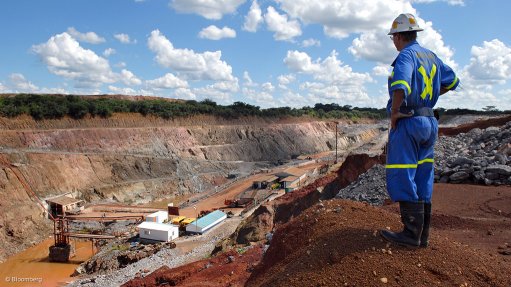
TRANSPARENCY NECESSARY A mine supervisor overlooks Chibuluma copper mine, near Kitwe, Zambia
Photo by: Bloomberg
Mining stakeholders are calling for increased transparency in the decision-making processes of Zambia’s Ministry of Mines and in the activities of mining companies, says member of the African arm of international commercial law firm DLA Piper and Zambia-based law firm Chibesakunda & Company partner Chil Chileshe.
“Depending on who you talk to about the shortcomings of the prevailing laws, the concerns vary,” she notes, adding that, for instance, small-scale mining licences are granted to companies only when they are 50.1%-owned and controlled by Zambian citizens. This makes it increasingly difficult for stakeholders to secure foreign investment, as foreign companies are unable to secure a large share or operational control of the mining operation.
However, Chileshe tells Mining Weekly that a draft Amendment Bill of Zambia’s Mines and Minerals Act of 2008, released last year for stakeholder input and which is still going through various stages of scrutiny and amendment, could result in a decrease in the threshold requirements for small-scale mining licences. Subsequently, softening the requirements for these licences could result in an increase in investment opportunities from multinational mining companies, she adds.
Another contentious issue regarding the legal framework governing mining in Zambia is the period for which prospecting licences are granted, which is currently seven years.
“Some stakeholders have indicated that the prospecting licence duration is not long enough and, [thus], licence holders do not have enough time to carry out and conclude prospecting operations before deciding whether to mine the tenements,” Chileshe comments.
However, the draft Amendment Bill could result in the tenure of prospecting licences being increased. More time to prospect should result in better mining preparation and improved prospecting results for mining companies.
Chileshe suggests that the Bill is also likely to deal with and change the decision-making process to grant various mining rights and licences. She notes that it is currently unclear what the proposed changes will be but the indications are that discretionary powers will vest in one director to make decisions based on the recommendations of an advisory panel.
“The reaction from mining companies is that the preferred approach would be to reduce the powers vested in one individual and allow such decisions to be made in consultation with other directors in order to allow for a more transparent process,” Chileshe asserts.
Should the Bill be passed in the form it had as at 2013, she notes, all activities dealing with mining rights, such as transferring and encumbering, will require approval from Zambia’s prevailing Minister of Mines and Minerals Development. “Therefore, the spectrum of activity requiring approval by the Minister will be significantly increased.”
Chileshe says that what the proposed amendments should aim for is to create a more transparent environment in which to operate, with increased comfort in security of tenure of mining rights and, consequently, increased foreign investment. “The current government seems keen to continue to get stakeholder input before finalising the Bill which can only result in a more balanced act, or at least one that has taken all points of view into account.
“What will be interesting to see is how wide the scope to monitor and approve activities in respect of mining licences will be, and what the practical effect of that will be,” she concludes.